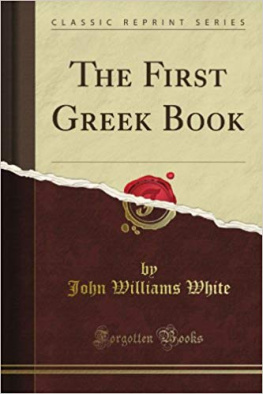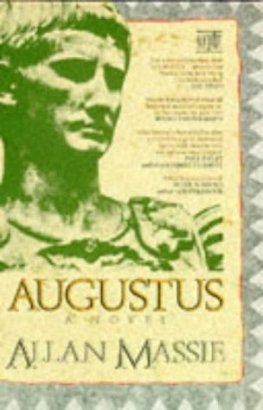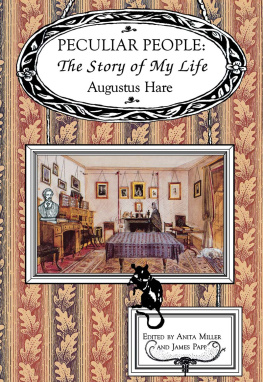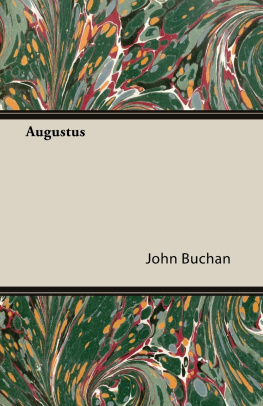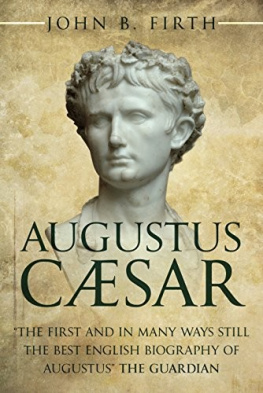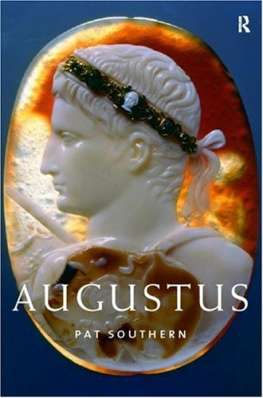John Williams - Augustus
Here you can read online John Williams - Augustus full text of the book (entire story) in english for free. Download pdf and epub, get meaning, cover and reviews about this ebook. genre: Prose. Description of the work, (preface) as well as reviews are available. Best literature library LitArk.com created for fans of good reading and offers a wide selection of genres:
Romance novel
Science fiction
Adventure
Detective
Science
History
Home and family
Prose
Art
Politics
Computer
Non-fiction
Religion
Business
Children
Humor
Choose a favorite category and find really read worthwhile books. Enjoy immersion in the world of imagination, feel the emotions of the characters or learn something new for yourself, make an fascinating discovery.

- Book:Augustus
- Author:
- Genre:
- Rating:5 / 5
- Favourites:Add to favourites
- Your mark:
- 100
- 1
- 2
- 3
- 4
- 5
Augustus: summary, description and annotation
We offer to read an annotation, description, summary or preface (depends on what the author of the book "Augustus" wrote himself). If you haven't found the necessary information about the book — write in the comments, we will try to find it.
Augustus — read online for free the complete book (whole text) full work
Below is the text of the book, divided by pages. System saving the place of the last page read, allows you to conveniently read the book "Augustus" online for free, without having to search again every time where you left off. Put a bookmark, and you can go to the page where you finished reading at any time.
Font size:
Interval:
Bookmark:
John Williams
Augustus
Letter: Julius Caesar to Atia (45 B. c.)
Send the boy to Apollonia.
I begin abruptly, my dear niece, so that you will at once be disarmed, and so that whatever resistance you might raise will be too quick and flimsy for the force of my persuasions.
Your son left my camp at Carthage in good health; you will see him in Rome within the week. I have instructed my men to give him a leisurely journey, so that you might have this letter before his arrival.
Even now, you will have started to raise objections that seem to you to have some weight-you are a mother and a Julian, and thus doubly stubborn. I suspect I know what your objections will be; we have spoken of these matters before. You would raise the issue of his uncertain health-though you will know shortly that Gaius Octavius returns from his campaign with me in Spain more healthy than when he began it. You would question the care he might receive abroad-though a little thought should persuade you that the doctors in Apollonia are more capable of attending his ills than are the perfumed quacks in Rome. I have six legions of soldiers in and around Macedonia; and soldiers must be in good health, though senators may die and the world shall have lost little. And the Macedonian coastal weather is at least as mild as the Roman. You are a good mother, Atia, but you have that affliction of hard morality and strictness which has sometimes disturbed our line. You must loosen your reins a little and let your son become in fact the man that he is in law. He is nearly eighteen, and you remember the portents at his birth-portents which, as you are aware, I have taken pains to augment.
You must understand the importance of the command with which I began this letter. His Greek is atrocious, and his rhetoric is weak; his philosophy is fair, but his knowledge of literature is eccentric, to say the least. Are the tutors of Rome as slothful and careless as the citizens? In Apollonia he will read philosophy and improve his Greek with Athenodorus; he will enlarge his knowledge of literature and perfect his rhetoric with Apollodorus. I have already made the necessary arrangements.
Moreover, at his age he needs to be away from Rome; he is a youth of wealth, high station, and great beauty. If the admiration of the boys and girls does not corrupt him, the ambitions of the flatterers will. (You will notice how skillfully I touch that country morality of yours.) In an atmosphere that is Spartan and disciplined, he will spend his mornings with the most learned scholars of our day, perfecting the humane art of the mind; and he will spend his afternoons with the officers of my legions, perfecting that other art without which no man is complete.
You know something of my feeling for the boy and of my plans for him; he would be my son in the fact of the law, as he is in my heart, had not the adoption been blocked by that Marcus Antonius who dreams that he will succeed me and who maneuvers among my enemies as slyly as an elephant might lumber through the Temple of the Vestal Virgins. Your Gaius stands at my right hand; but if he is to remain safely there, and take on my powers, he must have the chance to learn my strengths. He cannot do this in Rome, for I have left the most important of those strengths in Macedonia-my legions, which next summer Gaius and I will lead against the Parthians or the Germans, and which we may also need against the treasons that rise out of Rome By the way, how is Marcius Philippus, whom you are pleased to call your husband? He is so much a fool that I almost cherish him. Certainly I am grateful to him, for were he not so busily engaged in playing the fop in Rome and so amateurishly plotting against me with his friend Cicero, he might play at being stepfather to your son. At least your late husband, however undistinguished his own family, had the good sense to father a son and to find advancement in the Julian name; now your present husband plots against me, and would destroy that name which is the only advantage over the world that he possesses. Yet I wish all my enemies were so inept. I should admire them less, but I would be safer.
I have asked Gaius to take with him to Apollonia two friends who fought with us in Spain and who return with him now to Rome-Marcus Vipsanius Agrippa and Quintus Salvidienus Rufus, both of whom you know-and another whom you do not know, one Gaius Cilnius Maecenas. Your husband will know at once that the latter is of an old Etruscan line with some tinge of royalty; that should please him, if nothing else about this does.
You will observe, my dear Atia, that at the beginning of this letter your uncle made it appear that you had a choice about the future of your son. Now Caesar must make it clear that you do not. I shall return to Rome within the month; and, as you may have heard rumored, I shall return as dictator for life, by a decree of the Senate that has not yet been made. I have, therefore, the power to appoint a commander of cavalry, who will be second in power only to me. This I have done; and as you may have surmised, it is your son whom I have appointed. The fact is accomplished, and it will not be changed. Thus, if either you or your husband should intervene, there will be upon your house a public wrath of such weight that beside it my private scandals will seem no heavier than a mouse.
I trust that your summer at Puteoli was a pleasant one, and that you are now back in the city for the season. Restless as I am, I long for Italy now. Perhaps when I return, and after my business is done in Rome, we may spend a few quiet days at Tivoli. You may even bring your husband, and Cicero, if he will come. Despite what I say, I am really very fond of them both. As I am, of course, of you.
BOOK I
CHAPTER ONE
I. The Memoirs of Marcus Agrippa: Fragments (13 B. c.)
I was with him at Actium, when the sword struck fire from metal, and the blood of soldiers was awash on deck and stained the blue Ionian Sea, and the javelin whistled in the air, and the burning hulls hissed upon the water, and the day was loud with the screams of men whose flesh roasted in the armor they could not fling off; and earlier I was with him at Mutina, where that same Marcus Antonius overran our camp and the sword was thrust into the empty bed where Caesar Augustus had lain, and where we persevered and earned the first power that was to give us the world; and at Philippi, where he traveled so ill he could not stand and yet made himself to be carried among his troops in a litter, and came near death again by the murderer of his father, and where he fought until the murderers of the mortal Julius, who became a god, were destroyed by their own hands.
I am Marcus Agrippa, sometimes called Vipsanius, tribune to the people and consul to the Senate, soldier and general to the Empire of Rome, and friend of Gaius Octavius Caesar, now Augustus. I write these memories in the fiftieth year of my life so that posterity may record the time when Octavius discovered Rome bleeding in the jaws of faction, when Octavius Caesar slew the factious beast and removed the almost lifeless body, and when Augustus healed the wounds of Rome and made it whole again, to walk with vigor upon the boundaries of the world. Of this triumph I have, within my abilities, been a part; and of that part these memories will be a record, so that the historians of the ages may understand their wonder at Augustus and Rome.
Under the command of Caesar Augustus I performed several functions for the restoration of Rome, for which duty Rome amply rewarded me. I was three times consul, once aedile and tribune, and twice governor of Syria; and twice I received the seal of the Sphinx from Augustus himself during his grave illnesses. Against Lucius Antonius at Perusia I led the victorious Roman legions, and against the Aquitanians at Gaul, and against the German tribes at the Rhine, for which service I refused a Triumph in Rome; and in Spain and Pannonia, too, were rebellious tribes and factions put down. By Augustus I was given title as commander in chief of our navy, and we saved our ships from the pirate Sextus Pompeius by our construction of the harbor west of the Bay of Naples, which ships later defeated and destroyed Pompeius at Mylae and Naulochus on the coast of Sicily; and for that action the Senate awarded me the naval crown. At Actium we defeated the traitor Marcus Antonius, and so restored life to the body of Rome.
Font size:
Interval:
Bookmark:
Similar books «Augustus»
Look at similar books to Augustus. We have selected literature similar in name and meaning in the hope of providing readers with more options to find new, interesting, not yet read works.
Discussion, reviews of the book Augustus and just readers' own opinions. Leave your comments, write what you think about the work, its meaning or the main characters. Specify what exactly you liked and what you didn't like, and why you think so.

